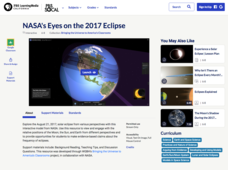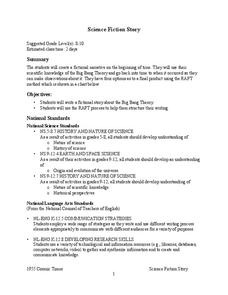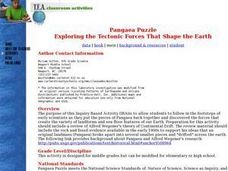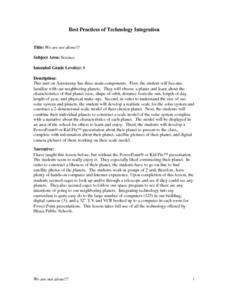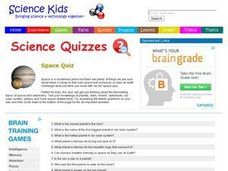Core Knowledge Foundation
Rocks & Minerals
Take young geologists on an exploration of the rock cycle with this six-lesson earth science unit on rocks and minerals. Through a series of discussions, demonstrations, and hands-on investigations your class will learn about the...
American Association for the Advancement of Science
Gravity Launch
Getting a ship into orbit isn't rocket science. Oh, wait...that's exactly what it is! Learn the basics of the concepts of thrust, launch angle, and gravitational pull in this fun and progressively challenging game.
Mr. E. Science
Erosion and Deposition
Get an in-depth look into erosion and deposition with a 23-slide presentation that details how gravity, water, waves, wind, and glaciers cause changes to the Earth's surface. Each slide consists of detailed images equipped with labels,...
NOAA
Satellite Communications
How do satellites communicate? What types of satellites orbit Earth? Discover and mimic the way satellites communicate between two points in a hands-on activity that has pupils using mirrors, flashlights, and marbles.
Weber State University
The Sun and the Seasons
Why is there more daylight in June than in December if you live above the equator? How does the angle of sunlight shift throughout the year? Answer these questions and more with an interactive article about the sun, its path through the...
CK-12 Foundation
Clarke's Dream
How does satellite TV keep a steady stream when the earth and the satellite are constantly moving? Scholars use a simulator to adjust the radius of orbit of a satellite around the earth. They view graphs of acceleration and time period...
PBS
NASA's Eyes on the 2017 Eclipse
How did the 2017 eclipse look in Los Angeles—or Chicago? Experience both views, plus many more, using a lesson from PBS's Space series for middle schoolers. Scholars follow the movements of the sun, moon, and Earth during the most recent...
PBS
The Planets of the Solar System
Launch a lesson that's sure to capture middle schoolers' interest! Exploration enthusiasts examine the planets of our solar system using an activity from PBS's Space series. The resource includes images and information for each planet,...
NASA
Science Fiction Story
A lesson allows you to go back in time and see the big bang actually happen. Bazinga! In reality, pupils research the Big Bang Theory and theorize what it would be like to go back in time and see it happen. There are four different...
Education Outside
Our Water Planet
Fresh water is a precious resource. Most kids don't realize how little of the water on Earth is actually drinkable. This instructional activity will help to illuminate them on this important topic. They discus the ratio of water to land,...
Curated OER
View of a Comet from Earth
Young scholars investigate comets. In this space science instructional activity, students study overhead transparencies of the orbits of Earth and a comet. Young scholars identify various locations and times where comets would be visible...
Curated OER
Astronomy and Me: Moons Over New Haven
Third graders study the features of different moons orbiting the planets. In this astronomy lesson, 3rd graders explore the different phases of the moon using an interactive online website. They compare and contrast the features of the...
Curated OER
Solar Cycle
Students explore the solar cycle through a series of experiments. In this space science lesson, students construct and evaluate solar cycle graphs. They explain how this phenomenon affects the Earth.
Curated OER
Pangaea Puzzle: Exploring the Tectonic Forces That Shape the Earth
Sixth graders follow in the footsteps of early scientists as they put the pieces of Pangaea back together and discovered the forces that create the variety of landforms and sea-floor features of our Earth.
Curated OER
Could the Solar System have Ten Planets?
Students react to statements about the solar system, then read a news article about a recently discovered object that could be another planet. In this space science and current events lesson, the teacher introduces the lesson with a...
Curated OER
Earth's Energy Cycle: Albedo
Students complete all of the steps in the scientific inquiry process to study Earth's energy cycle; most specifically temperature and the effects of albedo (energy reflected back from Earth's surface) on temperature.
Curated OER
Text Structures in Science Writing
Students recognize that science writing is organized in identifiable patterns called text structures. Understanding and using these different text structures help refine students' abilities to read and write in science.
Curated OER
We Are Not Alone!!!
Eighth graders explore the area of astronomy. They explore Earth's neighboring planets. Students research a planet's characteristics. They develop a scale model of the solar system and a narrative about the planets.
Curated OER
Science: Space Quiz
In this science: space quiz worksheet, students answer twenty questions, not interactively, about outer space, then scroll down to find the answers.
Curated OER
Introduction to Earth Sun Relationships Incorporating P.E.
Third graders investigate space science by performing physical activities. In this solar system lesson, 3rd graders perform a relay activitiy with their class in which they race between different "planets". Students define space...
Curated OER
People and Space
Students eat dehydrated foods that the astronauts would eat in space. In this dehydrated foods lesson plan, students make lists of food they could eat, discuss how dehydration takes place, eat food, and complete discussion questions.
Curated OER
Science Trail
Students explore the solar system by conducting Earth science experiments. In this Sun lesson, students identify the different seasons on Earth and discuss their purpose and cause. Students create a sundial and observe the changes to...
Curated OER
Space Program Spin-Offs
Students brainstorm types of accommodations needed for space travel. They create a table of categories for these accommodations and work in groups to research the categories. Each group puts together a five minute presentation to present...
Curated OER
Warming the Earth
First graders investigate how the sun warms the Earth and examine the rotation of the Earth and the sun. They create an illustration of the sun, examine a solar system model, and listen to the book "The Sun: Our Nearest Star." They also...
Other popular searches
- Earth and Space Science
- Earth Space Science
- Space Science on Earth
- +Earth and Space Science
- Earth Space Science Quiz
- Inquiry Earth Space Science
- Earth/space Science








